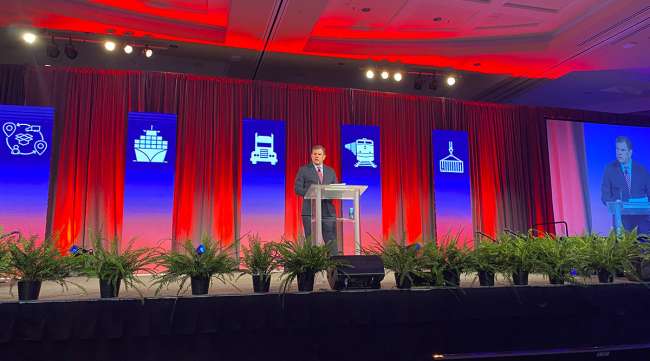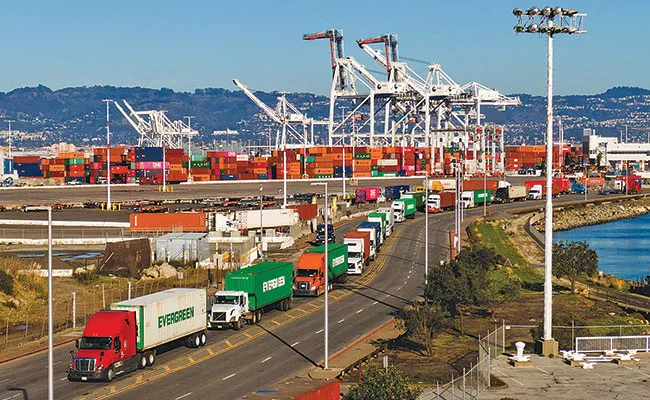Staff Reporter
FMC Chairman Breaks Down Post-Pandemic Supply Chain

[Stay on top of transportation news: Get TTNews in your inbox.]
Federal Maritime Commission Chairman Daniel Maffei at an industry event said the COVID-19 pandemic brought heightened awareness to supply chain issues and revealed what was working — and what wasn’t — across global shipping lanes.
“For us who work in and around containerized shipping, COVID did something,” he said during a Sept. 11 keynote address at the Intermodal Association of North America’s Intermodal Expo 2024. “It demonstrated to the world the incredible power of container shipping to sustain a global economy under the worst of circumstances. But at the same time, the pandemic revealed all of the hidden flaws.”
Maffei said with the heightened awareness also came increased attention, which placed supply chain issues at the center of national and international discourse. This is especially true as it relates to consumer issues, as more media attention is being paid to how goods move.
RELATED: IANA Applauds Outgoing President Joni Casey
“The emergence of supply chain awareness has affected the debates in politics and government,” Maffei said. “Americans may have been aware that most consumer goods were manufactured in other countries, but the pandemic exposed just how truly dependent Americans are on foreign nations, particularly China. For both supply chain resilience and political reasons, we started talking about more than China.”

Maffei
Maffei added, “My agency was once well under the radar. Now, the Federal Maritime Commission was suddenly thrust into a position of being at the forefront of major conversations about how ocean shipping could contribute to inflation and how it could be reformed.”
Those discussions, in turn, elevated broader focus on issues like reshoring and nearshoring, which aim to move production and supply chain operations closer to domestic endpoints. He also noted renewed calls to bring shipbuilding and crane manufacturing back to the U.S.; he said it was the first time in decades that politicians paid attention to those issues.
“Congressional committees suddenly were holding a myriad of hearings on the crisis, and they wanted to know how to solve it,” Maffei said. “Congress took up and passed — in a very short amount of time — a broadly bipartisan Ocean Shipping Reform Act. Since then, my to-do list as chairman has been set.”
That list found him in meetings with congressional leaders and the White House, participating in discussions on reforms that resulted in action at a time when lawmakers were divided on many issues.

Trucks line up to enter the Port of Oakland. Carriers applauded the passage of the FMC rule on demurrage and detention billing. (Noah Berger/Associated Press)
On May 28, FMC published a rule that reformed demurrage and detention billing to reduce abuse of the system. The rule also requires vessel-operating common carriers and multimodal transport operators to issue detention and demurrage invoices within 30 calendar days from when charges were last incurred. The commission also published a new rule to restrict unreasonable refusals to deal or negotiate vessel space accommodations.
“Our enforcement program went from assessing virtually no penalties at all in 2020 and 2021 to assessing over 2 million penalties in [fiscal year 2022] and nearly 3 million in FY23. So far in FY24, we’re on pace to match or exceed them,” Maffei said.
The Ocean Shipping Reform Act also mandated a fast-track complaint process for detention to merge billing complaints. The measure, Maffei said, aims to help shippers avoid protracted litigation and has so far resulted in over $2.5 million of waived and refunded charges.
TT's Seth Clevenger and Mike Senatore dive into the details behind the 2024 Top 100 Private Carriers list. Tune in above or by going to RoadSigns.ttnews.com.
Amid these advances, Maffei noted the existence of ongoing supply chain issues that must be addressed. These include disruptions caused by hostilities around the Red Sea and climate conditions that seriously curtailed traffic in the Panama Canal.
He also stressed that the agency has worked to make itself more reachable to stakeholders.
“While our responsive programs have been strengthened, the commission’s public outreach efforts have also been on our to-do list,” Maffei said. “Some of you may have noticed the commission’s website has recently been revamped to make information and resources related to our various complaint processes more readily available and accessible to share.”
Want more news? Listen to today's daily briefing below or go here for more info:





